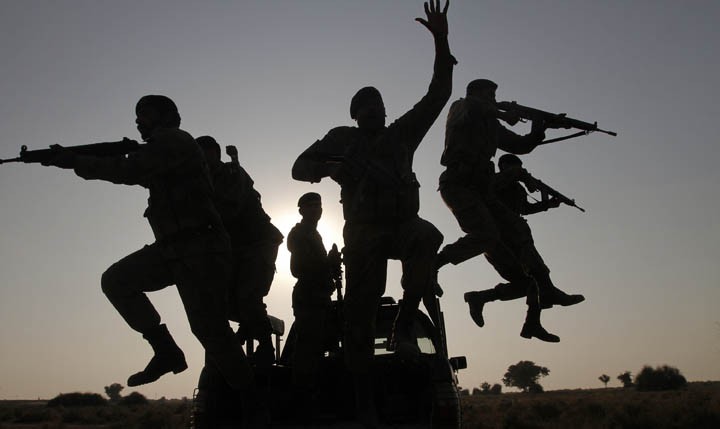
Only state can take remedial measures to stem violence in the name of Islam

The current article is a sequel to my previous article in which I argued that, in conjunction with international, regional and national factors, the genesis of the narrative of violence in the name of religion, perpetrated by a number of sectarian and militant outfits, in its milder form can be traced back to the Muslim politics in the pre-partition era. The current article suggests remedies to successfully defuse the situation. The principal theme of this article is that the state’s role is the key to neutralising the militant narrative of violence in the name of Islam.
A number of political pundits believe that it is the Islamist ideology inculcated at madrassas that is the reason for the existence of religious and sectarian violence in Pakistan. The essential point they all miss is that Islamist ideology taught in madrassas is a symptom of the problem of violence in the name of religion and not its cause.
Madrassas have a long history of existence spanning colonial and post-colonial times but, perhaps, they were hardly accused of inculcating violence anchored in religion until late 1970s when a number of international, regional and national events transformed madrassa sector for the worse. Although those international and regional situations subsided, it is the national scene that is marred by its deadly continuity.
The first remedial step is that the state needs to soft-pedal its undue dependence on the use of religion in public sphere because state’s reliance on religion has served to exacerbate religious and sectarian fault lines. Pakistan’s religious and sectarian milieus are far more diverse to fit any single description. In addition to 3.71 per cent non-Muslim citizenry, as per 1998 census, the 96.29 per cent Muslim majority is further divided into Shias, between 15-20 per cent by unofficial estimates, and Sunnis. Besides the far more numerous Twelvers, the other Shiite variations are Ismailis, Daudi Bohras and Sulemani Bohras. Within the Sunnis, the three sub-sects are Barelvi, Deobandi and the Ahle Hadees. Additionally, there are a motley crew of secular, liberal, leftist, atheist and agnostic citizenry who approve of religion in strictly personal life only.
Post independence, official reliance on religion in order to engender national unity, a hangover from All India Muslim League’s politics in the pre-partition era, inadvertently increased clergy’s influence in the business of the state with a serious consequence to make religious and sectarian identities more stubborn and narrower.
The declaration of Ahmadis as non-Muslim minority in September 1974 under article 260 3 (b) of the 1973 constitution, a process that began in earnest as early as 1954 and colluded with by Shia clerics with their Sunni counterparts, inevitably paved the way for similar demands on the part of Sunni clerics, especially of its Deobandi variation, who accused Shia Muslims of apostasy. Worse, schism runs deeper within the Sunni and Shia communities on the question of as to what constitutes being a good Muslim.
Zia’s Islamisation programme, a euphemism for state patronage of Sunni orthodoxy in legislation and politics, for all practical purposes, alienated the Shia minority that had remained apolitical prior to the launch of Iranian revolution of Shiite variation of Feb 1979 and made the community amenable to Iranian manoeuvrings informed by sectarian underpinnings. For the community, the state hugely compromised its role as a neutral arbiter since Zia’s days.
On the other hand, Saudi’s influence is more deeply entrenched. The country is the custodian of Islam’s holiest sites and there is a continuity of friendly ties between the two countries. Since early 70s, Saudi Arabia has been a favourite destination mainly for unskilled Pakistani labours who numbered 2.6 million as of 2016 as per Pakistan Foreign Office. Absent in Tehran’s case. Riyadh’s oil-related concessions to Islamabad are an additional leverage.
Discarding Iran and Saudi’s maligning influence altogether would be a more desirable option but minimising it, a more pragmatic course, requires dealing with Iran and Saudi Arabia equally. This calls for a gradual rollback of religious laws, especially of Zia’s period. Seemingly, Iran and Pakistani Shias see religious laws from Zia’s period through the prism of Saudi Arabia’s influence in Pakistan. The exchange of values and influences, not to speak of donations, through unofficial channels might appear an additional worry, however.
Cognizant of the fact that we live with multiple politico-religious identities that sometimes transcend national boundaries, one’s choices should be protected until they aid and abet militant causes or violate Pakistani laws. Nevertheless, militant sectarianism has also acquired its own independent momentum that will survive to exist even without external help. At domestic level, tackling militant goons requires dealing with them severely in accordance with laws.
The fallouts from the era of Afghan jihad endure to the day. After the fall of Taliban regime, Pakistan’s real Achilles’ heel has been the alleged existence of binary division of militants into good and bad Taliban both of whom justify their violence in the name of Islam. Since 2003 down to April 16, 2017, according to South Asian Terrorism Portal, 61975 Pakistanis have been killed with no less than 454 incidents of suicide attacks carried out by Islamist militants. From 2002 to 2016, the economic loss incurred due to Pakistan’s war on Islamist militants of al-Qaeda and Taliban and others of their ilk stood at a whooping $118 billion as per the findings of State Bank of Pakistan.
Seen through realistic lens, any policy whereby cost exceeds benefits is irrational. The more pragmatist option for Islamabad would be bringing Afghan Taliban to the negotiation table with the legitimate Afghan government and putting an end to the alleged patronisation of Taliban of all hues.
The question is, are those at the helm of affairs serious in eradicating militant violence? The past is a sad reminder of the fact that this has hardly been the case!